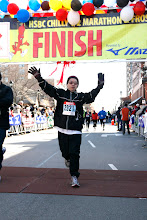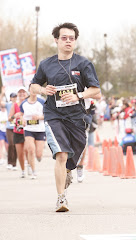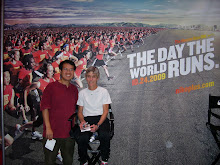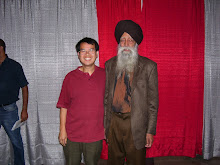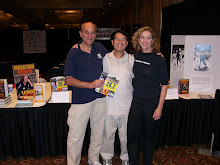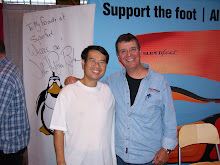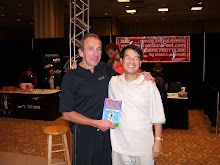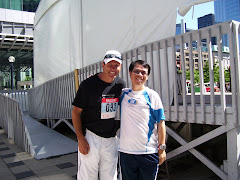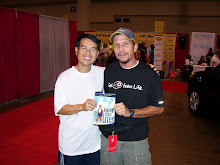Tonight's run after work marked 500 K :-) Taken a bit longer than last year but better late than never. 4.01 K. YTD = 501.7 K. Looking forward to LSD this week -- 24 K (tapper).
Thursday, April 28, 2011
Saturday, April 23, 2011
32 K LSD
Got in my 32 K LSD today :-) As I was sleeping, I heard the rain. Fortunately, when I began my run at 11 AM, the sun started to come out. Don't ask...slept in AGAIN (!) and took Bud on his morning walk before my run. Ran west on the Martin Goodman Trail west of the Humber River Bridge and the east to Cherry Street, then south close to Tommy Thompson Park -- had to make a turn as there was a muddy puddle that I couldn't seem to get across. Fortunately, no issues with the left foot :-) If the pattern continues, tomorrow the foot will be very sore. I already put both feet in cold water for several minutes. Will also put the droplets on the leg/foot -- doing it 3X a day. What can I say about the weather -- wore the toque for the first K and then wow -- it got humid. Stopped off at the Shopper's Drug Mart to buy Gatorade. 3 weeks until the Toronto Marathon.
Yesterday, as I was coming home from work, opted to head north on the Rosedale Valley to see what it looked like in the spring. There's a sidewalk so I should run south on it in the upcoming weeks before the big race.
YTD = 497.7 K
Yesterday, as I was coming home from work, opted to head north on the Rosedale Valley to see what it looked like in the spring. There's a sidewalk so I should run south on it in the upcoming weeks before the big race.
YTD = 497.7 K
Wednesday, April 20, 2011
4.01 K after work; left foot OK
Been a long week so far -- one more day to go until the long, long weekend :-) Did a 30 minute run after work, 4.01 K, in the school neighbourhood. Fortunately, no issues with the left foot. Tempted to make an appointment to see the physiotherapist as I cannot afford to have the left foot "ache" after each LSD -- and then to need 3 days off from running for the "aches" to go away. Cold weather today...
YTD = 465.7 K
YTD = 465.7 K
Saturday, April 16, 2011
Fauja Singh turned 100 years old on April 1st
28.23 K in the rain
LSD this morning -- woke up at 11:30 AM (!) -- don't ask...must be exhausted from work??? Anyways, it rained throughout the run and stopped in the final 30 minutes. Soaked and cold. Wore a toque to keep the head dry and warm. Mistake -- should have worn mittens -- right hand was numb. Was trembling when got home -- difficult to get out of the wet clothes. Hope I don't get a cold from all this. So this is what is meant by building character? Anyways, great run north on Yonge Street until York Mills Rd and then south, east on Bloor and then back home. Wanted to run up Hoggs Hollow -- no issues! Could feel the left foot with 1.5 hours left but got through the run without pain. The left foot did accidently step in a pothole (aargh!!!). 28.23 K run. Next week, I'll up it to 32 K (maximum mileage). 4 weeks until the Toronto Marathon! Just applied droplets to the left foot.
YTD = 461.7 K
YTD = 461.7 K
Wednesday, April 13, 2011
Left foot not fully healed; 30 min run today
After Saturday's LSD, the "pain" could be felt again in the left foot :-| Been applying the droplet medication. Did a 30 minute run after work and no issues :-) 4.15 K.
Saturday, April 9, 2011
LSD 30:1 (X6) and Thursday's run
Pleased to report I got in 3 runs this past week. Wednesday's run has already been reported. Thursday's run was 4.29 K after work, same route as the day before. Today got in 25.20 K running in the Martin Goodman Trail, east to and past the Humber River and back. I dropped by the Postage Stamp Show at the CNE, with free admission. Got some stamps from 3 decades ago at face value minus 10% along with some first day covers. Lastly, bought a Canadian stamp catalogue from the year 2008 for $5 (regular price $42.95).
YTD = 429.33 K
YTD = 429.33 K
Thursday, April 7, 2011
Yesterday's Class 4.18 K
Run after work yesterday :-) Always must "force" myself to run on the weekdays (so busy...). Ran in the neighbourhood after work. Nice weather as well. 4.18 K. Sooooooo close to 400 K. Way behind goal of 2011 K for the year but major goal is to run without injury before, during, and after the Toronto Marathon. YTD = 399.84 K.
Been running with my new shoes and no issues.
Been running with my new shoes and no issues.
Saturday, April 2, 2011
Article: Running Won't Kill Your Knees
JHarbeck posting the following article on the Running Room forum:
http://www.npr.org/2011/03/28/134861448/put-those-shoes-on-running-wont-kill-your-knees?sc=emaf
Yes, it's true: Jogging, long thought to hurt knees with all that pounding and rattling around, may actually be beneficial for the complex and critical joint. There are caveats, though, especially for people who have suffered significant knee injury or are overweight. But for the most part, researchers say, jogging for your health seems like a good idea.
David Felson, a researcher and epidemiologist at Boston University School of Medicine, says past concern about jogging and knees centered on the continuous impact of the foot to the ground and suggestion that it caused degeneration of the knee and the onset of osteoarthritis. But when researchers actually studied the impact of running on knees, he says, that's not what they found.
"We know from many long-term studies that running doesn't appear to cause much damage to the knees," he says. "When we look at people with knee arthritis, we don't find much of a previous history of running, and when we look at runners and follow them over time, we don't find that their risk of developing osteoarthritis is any more than expected." Both types of studies agree, says Felson, that recreational running doesn't increase the risk of arthritis.
'Running Is Healthy For The Joint'
In one study, Swedish researchers found that exercise, including jogging, may even be beneficial. Felson describes how researchers took one group of people at risk of osteoarthritis and had them engage in exercise, including jogging. The other group didn't exercise. After imaging the joints of the participants in both study groups, they found that the biochemistry of cartilage actually appeared to improve in those participants who were running. Felson says that suggests that "running is actually healthy for the joint."
Jonathan Chang, an orthopedic surgeon in Alhambra, Calif., says that exercise appears to stimulate cartilage to repair to minor damage. It could be that the impact of body weight when the foot hits the ground increases production of certain proteins in the cartilage that make it stronger, he says. This is similar to the way exercise, in particular weight-bearing exercise like jogging, increases bone and muscle mass.
According to Nancy Lane, director of the UC Davis Center for Healthy Aging who specializes in rheumatology and diseases related to aging, scientists are now starting to understand that there is some loss of cartilage annually after a certain age. Some doctors think cartilage loss
begins after age 40.
But, according to Lane, "if you have a relatively normal knee and you're jogging five to six times a week at a moderate pace, then there's every reason to believe that your joints will remain healthy."
An Indicator Of Activity
That's great news for Paul and Lyra Rider, avid joggers who live in the Hollywood Hills in Los Angeles. Jogging on Mulholland Drive, they say, offers fantastic views — along with a relatively flat route. Paul, 46, jogs a seven- to eight-minute mile — not as fast as his younger days. Lyra jogs a bit slower. She enjoys the exercise, health benefits and simplicity of jogging. "You don't need lots of fancy equipment, and you just feel great when you're done," she says.
Lane did some of the very first studies of runners and knees while she was a resident at Stanford University.
"We wanted to answer the important question of whether, if you continued to run into your 50s and 60s and even 70s, you also ran the risk of damaging the knees," she says. The answer, she says: absolutely not. And there was an extra bonus: While enthusiasm for jogging seemed to diminish as people hit their mid-60s, Lane says they were still more inclined than the non-joggers to get out and exercise.
"They were active doing other activities, like walking, yoga, water aerobics," she says. "We found that as these people aged, not only did they feel better about themselves, but their quality of life was better and they tended to actually live longer" than the non-joggers.
So, the message for joggers like the Riders, who hope to be jogging all their lives, is a hearty two thumbs up.
A Few Caveats
Lane cautions that if you have suffered a knee injury, especially one that required surgery, running can actually increase your risk of knee arthritis. So can routinely running really fast — at a five- or six-minute-mile pace — or running in a marathon. Lane's best advice? Running in moderation, at an eight- to 10-minute mile pace, for about 40 minutes a day.
But if people are more than 20 pounds overweight, Lane says they shouldn't start off with an intense running regimen.
"I have them walk and walk until they're to a point where I think their body mass is reduced enough that it won't traumatize their joints," she says. Otherwise, significantly overweight joggers run the risk of that extra weight stressing the knee to the point of inflammation, the formation of bony spurs and accelerated cartilage loss.
http://www.npr.org/2011/03/28/134861448/put-those-shoes-on-running-wont-kill-your-knees?sc=emaf
Yes, it's true: Jogging, long thought to hurt knees with all that pounding and rattling around, may actually be beneficial for the complex and critical joint. There are caveats, though, especially for people who have suffered significant knee injury or are overweight. But for the most part, researchers say, jogging for your health seems like a good idea.
David Felson, a researcher and epidemiologist at Boston University School of Medicine, says past concern about jogging and knees centered on the continuous impact of the foot to the ground and suggestion that it caused degeneration of the knee and the onset of osteoarthritis. But when researchers actually studied the impact of running on knees, he says, that's not what they found.
"We know from many long-term studies that running doesn't appear to cause much damage to the knees," he says. "When we look at people with knee arthritis, we don't find much of a previous history of running, and when we look at runners and follow them over time, we don't find that their risk of developing osteoarthritis is any more than expected." Both types of studies agree, says Felson, that recreational running doesn't increase the risk of arthritis.
'Running Is Healthy For The Joint'
In one study, Swedish researchers found that exercise, including jogging, may even be beneficial. Felson describes how researchers took one group of people at risk of osteoarthritis and had them engage in exercise, including jogging. The other group didn't exercise. After imaging the joints of the participants in both study groups, they found that the biochemistry of cartilage actually appeared to improve in those participants who were running. Felson says that suggests that "running is actually healthy for the joint."
Jonathan Chang, an orthopedic surgeon in Alhambra, Calif., says that exercise appears to stimulate cartilage to repair to minor damage. It could be that the impact of body weight when the foot hits the ground increases production of certain proteins in the cartilage that make it stronger, he says. This is similar to the way exercise, in particular weight-bearing exercise like jogging, increases bone and muscle mass.
According to Nancy Lane, director of the UC Davis Center for Healthy Aging who specializes in rheumatology and diseases related to aging, scientists are now starting to understand that there is some loss of cartilage annually after a certain age. Some doctors think cartilage loss
begins after age 40.
But, according to Lane, "if you have a relatively normal knee and you're jogging five to six times a week at a moderate pace, then there's every reason to believe that your joints will remain healthy."
An Indicator Of Activity
That's great news for Paul and Lyra Rider, avid joggers who live in the Hollywood Hills in Los Angeles. Jogging on Mulholland Drive, they say, offers fantastic views — along with a relatively flat route. Paul, 46, jogs a seven- to eight-minute mile — not as fast as his younger days. Lyra jogs a bit slower. She enjoys the exercise, health benefits and simplicity of jogging. "You don't need lots of fancy equipment, and you just feel great when you're done," she says.
Lane did some of the very first studies of runners and knees while she was a resident at Stanford University.
"We wanted to answer the important question of whether, if you continued to run into your 50s and 60s and even 70s, you also ran the risk of damaging the knees," she says. The answer, she says: absolutely not. And there was an extra bonus: While enthusiasm for jogging seemed to diminish as people hit their mid-60s, Lane says they were still more inclined than the non-joggers to get out and exercise.
"They were active doing other activities, like walking, yoga, water aerobics," she says. "We found that as these people aged, not only did they feel better about themselves, but their quality of life was better and they tended to actually live longer" than the non-joggers.
So, the message for joggers like the Riders, who hope to be jogging all their lives, is a hearty two thumbs up.
A Few Caveats
Lane cautions that if you have suffered a knee injury, especially one that required surgery, running can actually increase your risk of knee arthritis. So can routinely running really fast — at a five- or six-minute-mile pace — or running in a marathon. Lane's best advice? Running in moderation, at an eight- to 10-minute mile pace, for about 40 minutes a day.
But if people are more than 20 pounds overweight, Lane says they shouldn't start off with an intense running regimen.
"I have them walk and walk until they're to a point where I think their body mass is reduced enough that it won't traumatize their joints," she says. Otherwise, significantly overweight joggers run the risk of that extra weight stressing the knee to the point of inflammation, the formation of bony spurs and accelerated cartilage loss.
Week in Review
Thrilled to report 3 runs this week!
Wednesday -- Was in Newmarket for a meeting. We got out at 3:15 PM (yeah!) and that meant time for running :-) Ran in Markham with a running trail -- great stress-reliever. Spring is definitely here. 4.08 K
Friday -- Left work with sunlight as I wanted to get in a 30 minute run. Glad I did as the weather was spring-like. Ran in Richmond Hill in a running trail -- but a tad hilly for me :-| 4.05 K
Today -- woke up early in the morning and ran on the Martin Goodman Trail -- east to Humber Bridge River and back home. No issues with the left foot :-) Continue to apply the droplets to the lower leg/upper foot. 20.40 K
6 weeks until the Toronto Marathon! Lots of runners "out there" this morning.
YTD = 395.7 K
Wednesday -- Was in Newmarket for a meeting. We got out at 3:15 PM (yeah!) and that meant time for running :-) Ran in Markham with a running trail -- great stress-reliever. Spring is definitely here. 4.08 K
Friday -- Left work with sunlight as I wanted to get in a 30 minute run. Glad I did as the weather was spring-like. Ran in Richmond Hill in a running trail -- but a tad hilly for me :-| 4.05 K
Today -- woke up early in the morning and ran on the Martin Goodman Trail -- east to Humber Bridge River and back home. No issues with the left foot :-) Continue to apply the droplets to the lower leg/upper foot. 20.40 K
6 weeks until the Toronto Marathon! Lots of runners "out there" this morning.
YTD = 395.7 K
Subscribe to:
Comments (Atom)





















